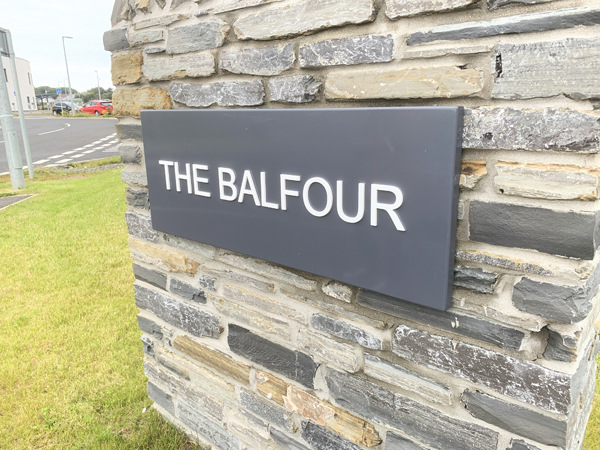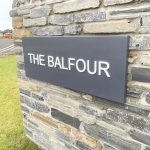

COVID ‘crisis’ situation not anticipated — NHSO boss responds to questions as cases mount

The Balfour’s COVID-19 unit is “not overwhelmed” and it is highly unlikely that such a situation will emerge.
This is the message of reassurance from NHS Orkney’s interim chief executive, Michael Dickson, who has today refuted suggestions that the hospital is struggling to cope with an influx of coronavirus related admissions.
Mr Dickson confirmed that a number of patients have been admitted to The Balfour’s COVID surge unit in recent days, amid mounting cases across the county.
More than 200 cases have been recorded in Orkney during the past fortnight, including over 100 in the past seven days. In the past 24 hours, 25 new cases have been attributed to Orkney, according to Scottish Government figures.
It is also understood that at least one Orkney coronavirus patient has been transferred to Aberdeen Royal Infirmary due to the severity of their illness.
“The surge unit is not overwhelmed,” Mr Dickson told The Orcadian, this Friday afternoon, in response to public speculation that The Balfour is struggling to accommodate COVID-19 patients.
“We are not spreading to areas where we don’t need to. We have got the capacity we need.”
Asked to refresh the community’s memory on what capacity The Balfour has for COVID patients, Mr Dickson said: “We have dedicated six beds in surge that use negative pressure so that the air is sucked out, rather than back in. We have two spaces in one of the wards which also has negative pressure. Negative pressure is critical, because you don’t want COVID to be blown into the rest of the ward.
“But, fundamentally, we have single rooms — so our capacity can be as big or small as it needs to be. We just need to change the airflows in a different way.
“From a ventilation point of view, that’s less of an issue. We have more ventilators than we need, because our ventilation model has changed. We would now transfer earlier, rather than wait for them to be ventilated and then move them. That’s about how our understanding of COVID has changed in the 20 months we’ve been dealing with this.
“In theory, if we needed to and there was a crisis — and I don’t predict any of this happening — every single room could be used for people with COVID-19, because we have a hospital built on the principle of single rooms, which is just phenomenal from an infection prevention control point of view.
“I don’t think we’re going to get there — I don’t think we’re going to get anywhere near there. I think we’ve got really good plans in place about we manage critically ill patients and how we work with our partners in Grampian to transfer them early, and we have a really great team of dedicated nurses, doctors and other health professionals who work collaboratively to deliver the best care, and that was reflected in the Healthcare Awards yesterday.”
Asked if there was a particular number of COVID-19 admissions which would trigger a crisis response from within the hospital, Mr Dickson said he didn’t think there was such a number. While he shared concerns about capacity pressures among health boards in the Scottish mainland, he said he was confident about the way admissions and discharges were functioning at The Balfour.
“There isn’t a fixed number where I go ‘right, we’ve got a crisis situation’,” he explained.
As a result of Orkney’s increased COVID-19 transmission, it is now listed having the second-highest infection rate of any community in Scotland, per head of population by Public Health Scotland. However, Earlier this week, Mr Dickson, suggested that the focus should not be on “league tables”, which can be misleading in small populations like ours. Today, he re-stated his belief that “less focus” should be given to case numbers now, as we move into the post-vaccination phase of the pandemic.
Asked if there was a case threshold which if crossed would prompt a tightening of restrictions locally, the interim chief executive said that this was “not the direction of travel we’re heading in” — but that smaller scale additional guidance for some organisations and groups could be a possibility.
“A care home is a really good example,” he said.
“If we were seeing a relative who was visiting someone in the care home, who had symptoms, and who didn’t do all the things they should do, we might close a care home to visiting. We might put in additional steps in terms of vulnerable groups within our community, and we might offer specific advice to them.
“Absolutely, if we found there was somewhere that wasn’t sticking to the guidance, we would support them and go in give better advice, and that would be led by our environmental health team over at OIC.
“But signalling widespread restrictions for the community? With the level of vaccination uptake that we have — particularly with the level of booster uptake for those people who are more vulnerable — that’s just not the direction of travel we’re heading in.”
- NHS Orkney is continuing to advise caution when mixing with people outside your household. Folk are being urged to stick to Public Health guidance when it comes to handwashing, mask-wearing and respiratory hygiene.
- If you develop COVID symptoms or receive a positive lateral flow result, you must self-isolate immediately with your household and book a PCR test. This can be done by phoning the COVID Assessment Centre on 01856 888211.